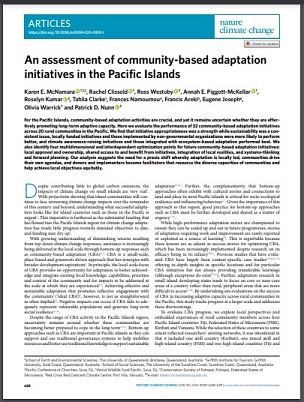
For the Pacific Islands, community-based adaptation activities are crucial, and yet it remains uncertain whether they are effectively promoting long-term adaptive capacity. Here we evaluate the performance of 32 community-based adaptation initiatives across 20 rural communities in the Pacific. We find that initiative appropriateness was a strength while sustainability was a consistent issue, locally funded initiatives and those implemented by non-governmental organizations were more likely to perform better, and climate awareness-raising initiatives and those integrated with ecosystem-based adaptation performed best. We also identify four multidimensional and interdependent optimization points for future community-based adaptation initiatives: local approval and ownership, shared access to and benefit from initiatives, integration of local realities, and systems-thinking and forward planning. Our analysis suggests the need for a praxis shift whereby adaptation is locally led, communities drive their own agendas, and donors and implementers become facilitators that resource the diverse capacities of communities and help achieve local objectives equitably.







